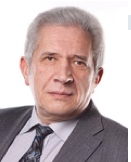A news bulletin contained a number of horror stories and fabricated facts, which were so rich in its fiction that it rivaled even the stories of 90s television in Russia. "We cannot let such a lack of regard for facts go unchallenged”, says Bellona's Zolotkov
On September the 13th, the Federal Russian TV channel «Russia 24» presented a bulletin: «The bottom of the Barents sea is being cleared from nuclear dumps from the Soviet era” (in Russian). This reportage contains a number of horror stories and fabricated facts, which were so rich in its fiction that it rivaled even the stories of 90s television in Russia. The link to the bulletin was unfortunately removed by the channel this week. The governor of Murmansk has stated that the information will be corrected after Bellona disproved it on our Russian web page.
The corrections Bellona made are stated here:
“The reactor of a sunken submarine was raised from the bottom of the Kola Bay. A floating dock, “ItaRus”, built specifically for this purpose in the framework of a Russian-Italian agreement, participated in the operation. The floating dock can carry up to three and a half thousand tons of goods”, said the cheerful female narrator in the TV channel’s bulletin.

According to Andrey Zolotkov with Bellona’s office in Murmansk, they found the news greatly disturbing. “From the first phrase, something was not right. First of all, no nuclear object has been lifted from the bottom of the Barents Sea. The second, no nuclear submarine was ever dumped in the Kola Bay – that is why the federal TV channel is not mentioning where this submarine came from, although the news channel let their viewers know that it “had been there for many years”.”
The news channel continued, saying that the floating dock “ItaRus” was engaged in an operation with the goal of lifting three submerged compartment units of a decommissioned nuclear powered submarine in Sayda Bay.
“We have to emphasize that the units are floating, it has never been dumped on the bottom of any Bay. This is a routine operation for any floating dock: it is being put under water, then an object (unit of a submarine) is put on the dock’s site, and then they lift the dock up with the unit on it. The “ItaRus” is then to transport the compartments to a special site in Sayda Bay for further dismantlement”, Zolotkov explains.
“It never sinks during this operation, but is partially submerged to ease the process of loading heavy objects onto it in the water. The floating dock is then able to transport any loaded object to a desired location, or it is left in place, which is the case in most shipyards.”
The TV-channel continued to make mistakes: It misplaced the storage facilities for spent nuclear waste from nuclear submarines and icebreakers in Andreyeva Bay (Motovsky Bay), saying it was located in the Kola Bay, closer to the cities of Severomorsk and Murmansk. The journalists went on, claiming that “here, heat-utilizing compartments lie submerged in the waters of Kola Bay”.
“This is the first time Bellona has heard about such a thing as “heat-utilizing compartments”. As far as we know, there is no such thing,“ assures Zolotkov. “They have made it up, and it is unclear what they might be referring to.”
“Bellona officially states that reactors of nuclear powered submarines have never been dumped in the Kola Bay. There hgas been no dumping of any “heat-utilizing compartments” in the Andreyeva Bay. Rosatom has strict control with all objects with spent nuclear fuel and radioactive waste in Andreyeva Bay.”, continues Zolotkov.
“We will not even try to imagine what would happen to the reputation of an organization like Bellona if our experts allowed themselves to make this kind of mistakes in their work. We hope that the State Atomic Energy Corporation, Rosatom, will try to correct these false facts, as they potentially can damage the reputation of the Murmansk region in the long run”.
“It is not often that we have to defend the work and efforts of Rosatom in its nuclear and radiation safety projects being implemented in Murmansk region, but we cannot let such a lack of regard for facts go unchallenged”, Zolotkov concludes.
Update: In the aftermath of these blunders by the federal TV-channel “Russia-24”, Denis Pleschenko, chief of communications in the Federal State Unitary Enterprise “RosRAO”, who manages spent nuclear fuel in Russia, has supported Bellona’s corrections. In his statement, he also thanked Bellona for the organization’s effectiveness and professionalism.





